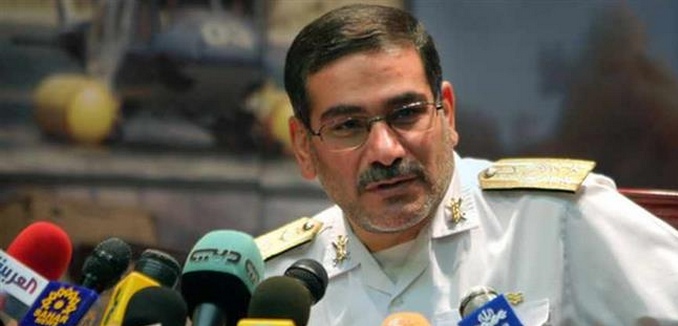Iran and Russia share a military base in Syria in order to coordinate their defense of Syrian president Bashar al-Assad, a top Iranian security official revealed Tuesday.
Ali Shamkhani, the secretary of Iran’s Supreme National Security Council, was quoted by Iranian media as claiming that there is “a shared base in Syria where Iran, with Russia’s help, does advisory work to help the Syrian army and the [pro-Assad] resistance forces.”
Shamkhani, who is responsible for coordinating Tehran’s political, military, and security concerns with Syria and Russia, also stated that the two nations were cooperating “to design the military aspect of the fight against terrorism.”
Allowing Russia to use Iran’s air space was part of a cooperation agreement that the two countries reached last year, Shamkhani said. The pact was coordinated by Islamic Revolutionary Guard Corps-Quds Force commander Gen. Qassem Soleimani, who flew to Moscow to make the deal despite an international travel ban imposed on him by the United Nations due to his support for terrorism.
Gen. Mohammad Hossein Baqeri, the chief of staff of the Iranian armed forces, said last month that the Islamic Republic is looking to establish naval bases in Syria and Yemen to help it project its power more efficiently in the region. “This will have troubling implications, mainly for Israel, Saudi Arabia, and the United States, and for Egypt and Turkey,” former IDF colonel Ephraim Kam wrote in an analysis for the Institute for National Security Studies on Wednesday.
He continued:
The worst-case scenario is the construction of a permanent base in Syria, which connotes a permanent naval arm in the Mediterranean Sea and an Iranian military presence in proximity to Israel, while creating a threat and establishing deterrence against Israel. Moreover, the establishment of a naval base in Syria will enable Iran to transport regular supplies and other assistance to Hezbollah, without being dependent upon overland convoys or aerial transport through Syria, Iraq, and/or Turkey, and will serve its intelligence collection needs. The establishment of a naval base in Yemen will exacerbate the Iranian threat from the south against Saudi Arabia, and will provide Iran with the ability to pose a threat at the entrance to the Red Sea, and a capacity to affect the navigation of ships towards the Suez Canal and the Gulf of Eilat in the event of a confrontation.
Iran’s shared base with Russia and its desire for naval expansion suggest that last year’s nuclear deal has not whetted Iran’s imperial ambitions. Joshua Muravchik, a distinguished fellow at the World Affairs Institute, predicted as much last year:
All this means Iran will grow more daring and aggressive, perhaps leading to more direct conflict with its archrival, Saudi Arabia, whose alarm at the nuclear deal may well equal Israel’s although it is expressed less volubly. Already Tehran and Riyadh are at war in Yemen, in part through proxies but also with their own forces. There are numerous imaginable flashpoints at which this could intensify. Iran’s Yemeni allies, tutored by Hezbollah, could strike on Saudi territory. Bahrain’s restive Shiite majority could rise against their Sunni monarch and Saudi forces would intervene, but now an emboldened Iran, which claims Bahrain as its own territory, might take action on the other side. In Saudi Arabia itself, Iran has in the past stirred revolt among the Shiite minority, ten percent of the population concentrated in the east where the oil is. In short, a more direct and violent Iranian-Saudi confrontation is easily imaginable. The United States, which sent half a million soldiers to rescue Kuwait from Iraq, would do anything in its power to defend Saudi Arabia from Iran.
[Photo: PressTV ]




